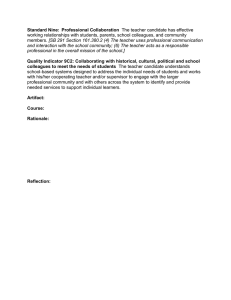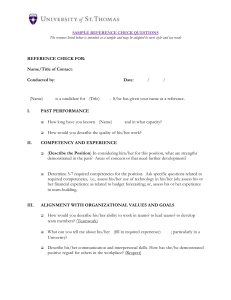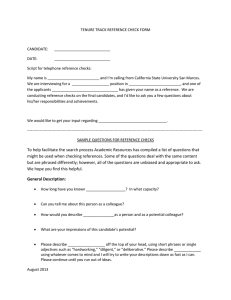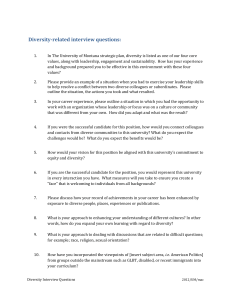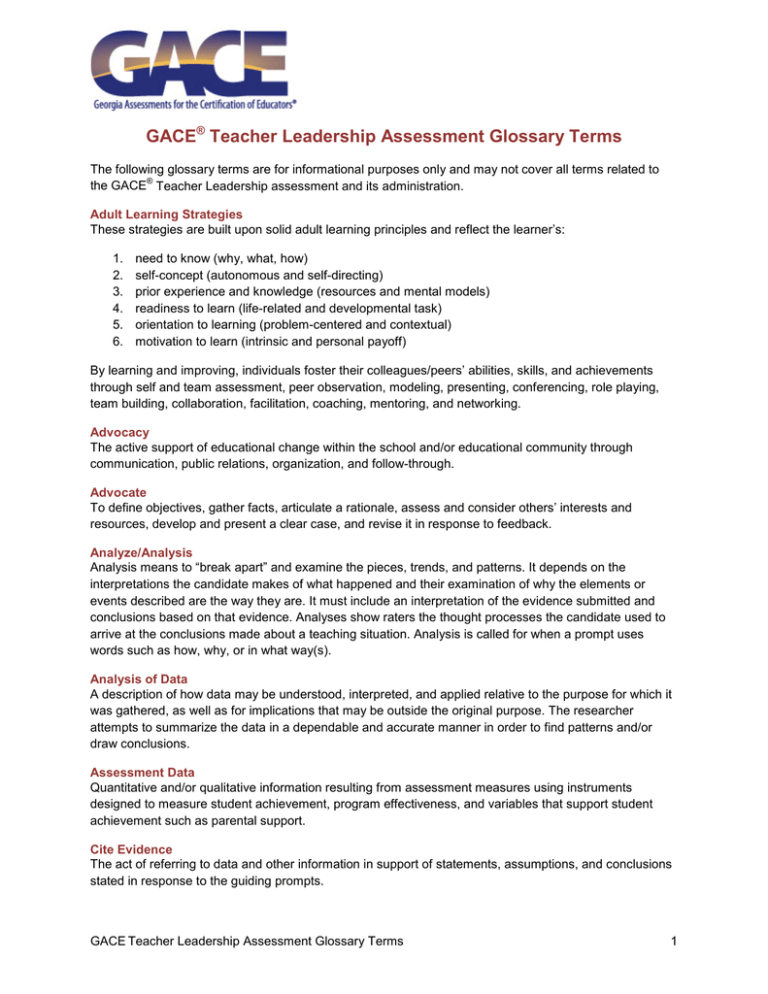
GACE® Teacher Leadership Assessment Glossary Terms
The following glossary terms are for informational purposes only and may not cover all terms related to
®
the GACE Teacher Leadership assessment and its administration.
Adult Learning Strategies
These strategies are built upon solid adult learning principles and reflect the learner’s:
1.
2.
3.
4.
5.
6.
need to know (why, what, how)
self-concept (autonomous and self-directing)
prior experience and knowledge (resources and mental models)
readiness to learn (life-related and developmental task)
orientation to learning (problem-centered and contextual)
motivation to learn (intrinsic and personal payoff)
By learning and improving, individuals foster their colleagues/peers’ abilities, skills, and achievements
through self and team assessment, peer observation, modeling, presenting, conferencing, role playing,
team building, collaboration, facilitation, coaching, mentoring, and networking.
Advocacy
The active support of educational change within the school and/or educational community through
communication, public relations, organization, and follow-through.
Advocate
To define objectives, gather facts, articulate a rationale, assess and consider others’ interests and
resources, develop and present a clear case, and revise it in response to feedback.
Analyze/Analysis
Analysis means to “break apart” and examine the pieces, trends, and patterns. It depends on the
interpretations the candidate makes of what happened and their examination of why the elements or
events described are the way they are. It must include an interpretation of the evidence submitted and
conclusions based on that evidence. Analyses show raters the thought processes the candidate used to
arrive at the conclusions made about a teaching situation. Analysis is called for when a prompt uses
words such as how, why, or in what way(s).
Analysis of Data
A description of how data may be understood, interpreted, and applied relative to the purpose for which it
was gathered, as well as for implications that may be outside the original purpose. The researcher
attempts to summarize the data in a dependable and accurate manner in order to find patterns and/or
draw conclusions.
Assessment Data
Quantitative and/or qualitative information resulting from assessment measures using instruments
designed to measure student achievement, program effectiveness, and variables that support student
achievement such as parental support.
Cite Evidence
The act of referring to data and other information in support of statements, assumptions, and conclusions
stated in response to the guiding prompts.
GACE Teacher Leadership Assessment Glossary Terms
1
Collaboration
Ongoing communication among professionals and stakeholders using a variety of formats (e.g.,
conferences, email, conference calls) to discuss, plan, and deliver course work, experiences,
competencies, knowledge, and skills.
Collaborative Support
Providing assistance to a group of educators or other stakeholders working together toward a common
goal(s); assistance may include organization, guidance, supplying resources, or making connections with
additional support opportunities.
Collaborative Teams
Collaborative teams are groups of educational colleagues working together toward common goals.
Colleagues
Colleagues are professional employees with whom the teacher leader works. This would include, but is
not be limited to, teachers, administrators, and curriculum coordinators.
Data
Information, facts, measurements, and statistics are all data that provide insight into learning.
Differentiated
Opportunities designed to meet students’ varying readiness levels, experience levels, and learning
modes.
Evidence
Evidence is information the candidate provides to show that the Teacher Leadership standards are being
addressed. Evidence can be found in response to the guiding prompts and in any accompanying artifacts.
Facilitator
A facilitator is someone who helps a group of colleagues understand common objectives, and assists
them in developing and implementing a plan to achieve those objectives without taking a particular
position in the discussion. The facilitator assists the group in achieving a consensus on any
disagreements that pre-exist or emerge during meetings so that there is a strong foundation for future
action.
Feedback
For the purpose of the Teacher Leadership assessment, feedback is an evaluative response to a process
or activity elicited from colleagues and other stakeholders to inform professional growth.
Formative Assessment
Formative assessments are incorporated into classroom practice to provide teachers with information
about student progress in order to adjust teaching and learning on an ongoing basis. Formative
assessments inform both teachers and students about student understanding to allow for timely
adjustments, which ensure students achieve targeted standards-based learning goals within a set time
frame.
Guiding Prompts
Guiding prompts are the questions and requested descriptions within the assessment tasks that are
presented in a strategic order to help the candidate address each of the elements of the standard. The
candidate’s responses to the guiding prompts create the written commentary.
GACE Teacher Leadership Assessment Glossary Terms
2
Impact
The effect the teacher leader has on the professional growth of colleagues, as well as their effect on
students and other stakeholders.
Informal or Formal Survey
A device used by the teacher leader to elicit information from colleagues and/or families, the community,
and other stakeholders. An informal survey does not require written responses to questions, but may be a
conversation between or among colleagues. In contrast, a formal survey requires a written response such
as a questionnaire developed by the teacher leader and given to colleagues.
Model
A type of learning where a candidate ascertains how to act or perform by observing another individual. An
example would be the teacher leader’s modeling of appropriate ways to teach a lesson or question
appropriately.
Needs Assessment
Needs assessment is a systematic process, either formal (i.e., requiring a written response) or informal
(i.e., not requiring a written response) to acquire data from colleagues, students, parents, community
members, and other stakeholders that reflects an accurate, thorough picture of the school community’s
strengths and weaknesses, which the teacher leader uses to support the improvement of student
achievement.
Observation
Watching and studying a teacher in order to arrive at decisions about his/her practice based on objective
data gathered in diverse classroom settings. Observation can be direct, or it can be indirect through the
use of video recording.
Pre-observation Meeting
A pre-observation meeting occurs between the candidate and the classroom teacher prior to observation
as a part of the facilitation of the teacher’s professional growth.
Post-observation Meeting
A post-observation meeting occurs between the candidate and the classroom teacher after the
observation for the analysis of what was observed.
Professional Development
Professional development is an activity or activities designed to promote continuous professional growth
and improvement through advancing knowledge and skills as well as honing personal qualities required in
the profession.
Professional Development Plan
A professional development plan is a researched and organized process resulting in a proposal of
activities to promote professional growth for colleague
Protocol
A protocol is a set of prompts that provide structure for recording information from observation sessions.
The prompts include who is being observed, what is occurring during the observation, and what will be
the observer’s level of participation in the observation.
Rationale
A rationale is the underlying principle or justification for a decision that is made. A rationale should be
related to the teaching and learning context as described by the candidate and should reflect the analysis
prompted by the guiding question.
GACE Teacher Leadership Assessment Glossary Terms
3
Reflection
Thoughtful, insightful, data-driven analysis of one’s professional practice that begins with a candidate’s
inferences from evaluating a lesson or learning activity and concludes with the candidate’s decision about
what to do next or differently as a result of this information.
Reflective Dialogue
A communication engaged in by two or more individuals about their experience(s) and how they might
approach similar situations the same or differently in the future.
Stages of Career Development
Stages of career development are levels of professional development based on years of experience,
extent of involvement with student-school-community activities, and depth and breadth of content and
pedagogical knowledge. Based on experience, a teacher is classified as a beginner, experienced, or
veteran. Based on expertise, a teacher is classified as initial, professional, or master teacher.
Stakeholder
Stakeholders are individuals or groups who have a vested interest in the success of an educational
organization (e.g., colleagues, students, parents, community members, community organizations
including businesses, government agencies, and non-profits).
Stakeholder Feedback
Stakeholder feedback is an evaluative response from one who has a share or interest in student
education outcomes. It is used to measure satisfaction for quality management, and to help with
continuous improvement.
Summative Assessment
Summative assessment is a means of measuring student progress to determine what students do and do
not know, usually given at the conclusion of a unit or course of study.
Summative assessment at the district/classroom level is an accountability measure generally used as part
of the grading process.
Technology and Media Literacy
Media literacy is knowledge across the curriculum in areas such as media production, information
technology, critical media literacy, web-based literacies, aesthetic literacies (e.g., dance, music, and
theater), communications, and scientific literacy.
Technology refers to the equipment and software available to the teacher leader and the
school/classroom to produce multimedia (e.g., white boards, computers, computer programs, and access
to the Internet).
Copyright © 2014 by Educational Testing Service. All rights reserved.
ETS is a registered trademark of Educational Testing Service (ETS). Georgia Assessments for the Certification
of Educators, GACE, and the GACE logo are registered trademarks of the Georgia Professional Standards Commission.

